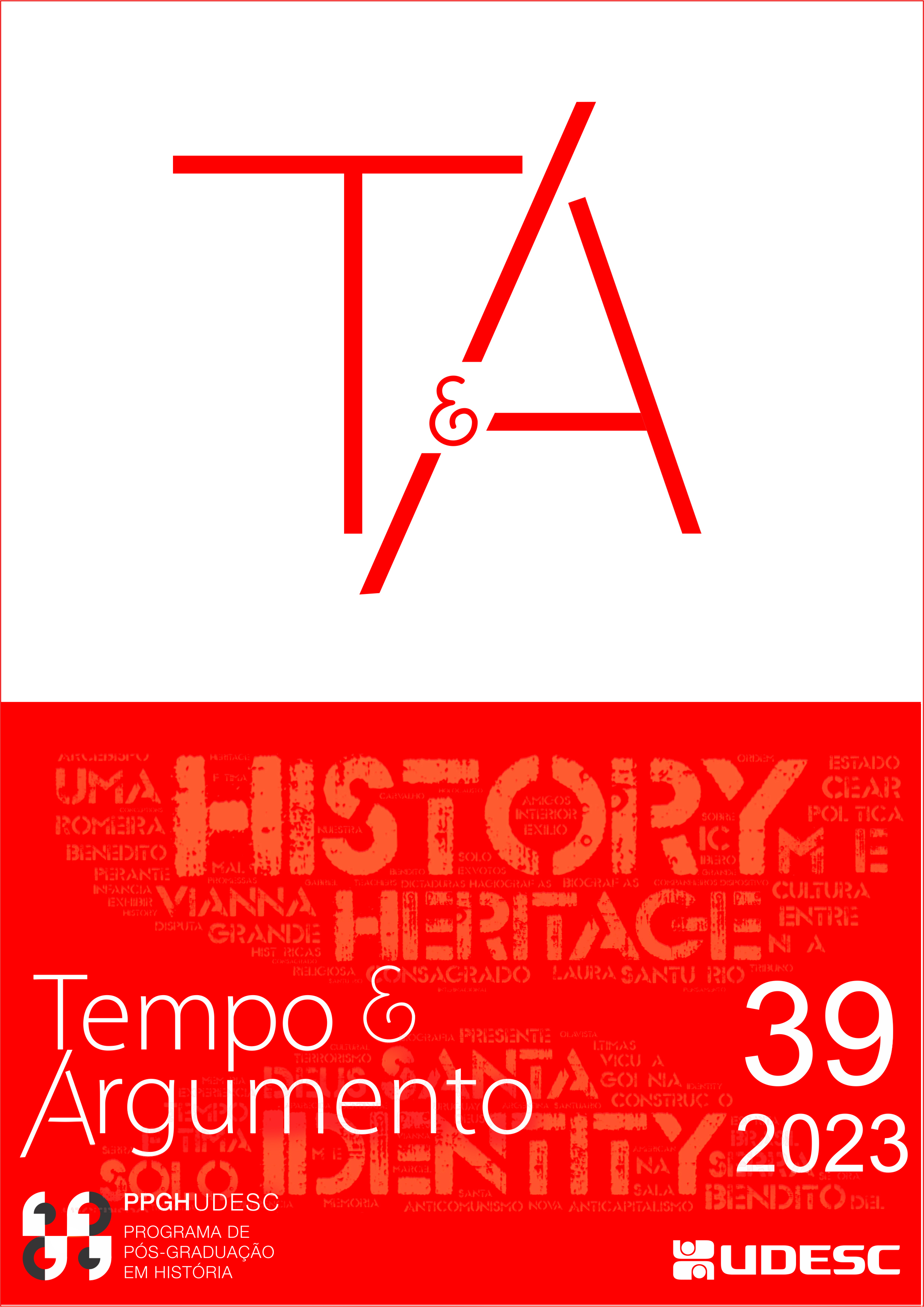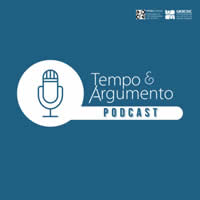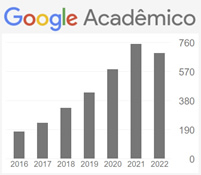Between anticommunism and anticapitalism: the archbishop of Goiânia before terrorism of State in Brazil
DOI:
https://doi.org/10.5965/2175180315392023e0101Keywords:
catholicism, anti-communism, dictatorship, justice, Cold WarAbstract
The holding of Second Vatican Ecumenical Council (1962-1965), with more than two hundred Brazilian bishops presents, changed the way of living the Christian faith in this country, however the dictatorial regime established in 1964, with institutional acts (A.I’s) and practices of political repression, interfered in this renewal process of Catholicism. This text analyzes the changes that occurred in the environment of the Archdiocese of Goiânia, central region of Brazil, which was under the staff of Dom Fernando Gomes dos Santos (1957-1985). The dimension of social justice was an important principle adopted in the process of receiving conciliar decisions, centrally inserted in the pastoral plans developed in the sixties of the twentieth century. This principle led the Catholic clergy to disagree with the simplistic anti-communism, propagated by authoritarian State, and, simultaneously, it was a platform for critique of capitalism.
Downloads
References
CAMACHO, Ildefonso. Doutrina social da Igreja: abordagem histórica. São Paulo: Loyola, 1995.
CELAM. Documento de Medellín: presença da Igreja na atual transformação da América Latina à luz do Concílio Vaticano II. [S.l.], 1968. Disponível em: www.faculdadejesuita.edu.br/eventodinamico/eventos/documentos/documento-FwdDtt9v3ukKPDZq.pdf. Acesso em: 28 jan. 2021.
CERTEAU, Michel de. Les chrétiens et la dictature militaire au Brésil (1969). In: CERTEAU, Michel de. La faiblesse de croire. Paris: Éditions du Seuil, 1987. p. 137-162.
CHAOUCH, Malik Tahar. La teologia de liberación em América Latina: una relectrua sociológica. Revista Mexicana de Sociología, Ciudad de Mexico n. 69, p. 427-456, 2007.
CNBB. Mensagem da Comissão Central da CNBB. Revista da Arquidiocese de Goiânia, Goiânia, ano 7, n. 4, p. 243-252, abr. 1963.
CNBB. Declaração dos bispos. Revista da Arquidiocese de Goiânia, Goiânia, ano 8, n. 6-7, p. 215-216, jun./jul. 1964.
DUFOUR, Dany-Robert. Baise ton prochain: une histoire suterraine du capitalisme. Paris: Acte Sud, 2020.
FICO, Carlos. O grande irmão: da operação Brother Sam aos anos de chumbo. O governo dos Estados Unidos e a ditadura militar brasileira. Rio de Janeiro: Civilização Brasileira, 2008.
FICO, Carlos. Ditadura militar: prefácios, palestras e posts. Amazon: eBook Kindle, 2020. E-book.
GIDDENS, Anthony. A terceira via. 5. ed. Rio de Janeiro: Editora Record, 2005.
FRANCHINI NETO, Hélio. A política externa independente em ação: a Conferência de Punta del Este de 1962. Revista Brasileira de Política Internacional, Brasília, v. 48, n. 2, p. 129-151, jul./dez. 2005.
HARMER, Tanya. The Cold War in Latin America. In: KALINOVSKY, Aretemy M.; DAIGLE, Craig (ed.). The Routledge handbook of the Cold War. London: Taylor & Francis Group, 2014. p.133-149.
HOBSBAWN, Eric. Era dos extremos. São Paulo: Companhia das Letras, 1995.
KOSELLECK, Reinhardt. Futuro passado: contribuição à semântica dos tempos históricos. Rio de Janeiro: Editora PUC Rio, 2006.
LACLAU, Ernesto. La razón populista. Buenos Aires: Fondo de Cultura, 2010.
LEFFLER, Melvyn; WESTAD, Odd (ed.). The Cambridge History of Cold War (3 vol.). New York: Cambridge Press, 2010.
LINDBERG, Carter. Reformation. In: PATTE, Daniel. (ed.). The Cambridge dictionary of Christianity. New York: Cambridge University Press, 2010, p.1058.
LOWY, Michael. O que é cristianismo da libertação?: religião e política na América Latina. São Paulo: Expressão Popular, 2016.
MOTTA, Rodrigo Patto Sá. Em guarda contra o perigo vermelho: o anti-comunismo no Brasil. São Paulo: Editora Perspectiva, 2002.
NORDESTE. Declaração dos bispos do Nordeste, reunidos por ocasião da posse de Dom Helder Câmera. Revista da Arquidiocese de Goiânia, Goiânia, ano 8, n. 5, p.177-179, maio 1964.
ORLANDI, Eni P. A linguagem e seu funcionamento. 2. ed. Campinas: Pontes, 2003.
RICCARDI, Andrea. Começa a Assembleia. In: ALBERIGO, Giuseppe (org.). História do Concílio Vaticano II (vol. 2). Petrópolis: Editora Vozes, 2000. p. 77-110.
RODRIGUES, José Honório. Conciliação e reforma no Brasil: um desafio histórico-cultural. Rio de Janeiro: Civilização Brasileira, 1964.
SANTOS, Dom Fernando Gomes. O encontro no Rio de Janeiro. Goiânia: IPEHBC, 1973. Caixa nº12 do fundo Dom Fernando.
SANTOS, Dom Fernando Gomes. Mensagem de páscoa. Revista da Arquidiocese de Goiânia, Goiânia, ano 8, n. 5, p. 182-187, maio 1964.
SERBIN, Kenneth. Diálogos na sombra: bispos e militares, tortura e justiça social na Ditadura. São Paulo: Companhia das Letras, 2001.
SILVA, Aline de V. João Goulart e as Reformas de Base. Textos e Debates, Florianópolis, v. 1, n. 32, p. 5-20, 2019.
SILVA, Wellington T. Frei Carlos Josaphat, catolicismo e revolução social. Revista Caminhos, Goiânia, PUC Goiás, v. 16, n. 1, p. 196-207, 2018.
TRAVERSO, Enzo. O passado: modos de usar. Lisboa: UNIPOP Editora, 2012.
VALÉRIO, Mairon E. O continente pobre e católico: o discurso da Teologia da Libertação e a reinvenção religiosa da América Latina. 2012. Tese (Doutorado em História) − Unicamp, Campinas, 2012.
Downloads
Published
How to Cite
Issue
Section
License
Copyright (c) 2023 Tempo e Argumento

This work is licensed under a Creative Commons Attribution-NonCommercial 4.0 International License.
The articles published by the magazine are for free use, destined for educational purposes and not commercial. The copyrights are all granted to the magazine. The articles whose authors are identified represent the expressed opinion of its authors and not the official position of the Tempo e Argumento magazine or of the Postgraduate Program in History of the Universidade do Estado de Santa Catarina.




